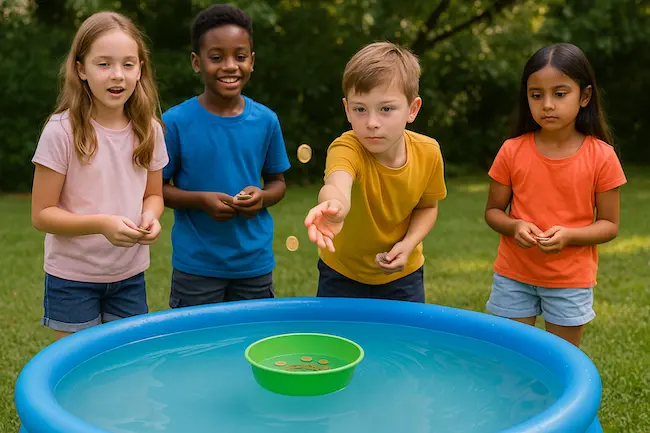Map Quest: a treasure hunt game with maps and clues
Map Quest is a captivating group game where players use a map and a series of clues to locate hidden treasures across a defined space. Perfect for birthdays, classroom projects, family outings, or team-building events, this quest-style game turns any location into a field of discovery and adventure.
Game overview and setup
Before launching the quest, here’s what you need to know to organize the game smoothly and keep the experience immersive for all ages.
- Number of players: from 3 children
- Age range: from 6 years old
- Location: indoors or outdoors
- Play time: about 40 minutes
Looking for a treasure hunt with a pirate twist? Try The Treasure of the Cursed Fort — a ready-to-play printable kit packed with challenges for ages 6–7.
What you need to play Map Quest
To fully enjoy this adventure, prepare the following materials in advance. This ensures a smooth setup and an engaging gameplay experience.
- Customized maps of your playing area with marked checkpoints or treasure spots
- Clues (written or illustrated) that guide players from one location to another
- Tokens or small treasures to hide at each location
- Optional prizes to reward the most successful teams
- Compasses (optional) to add a layer of difficulty and realism
How to play Map Quest
Here’s a breakdown of the rules to help you facilitate a dynamic and cooperative treasure hunt.
After hiding the treasures and preparing clues:
- Create teams and hand each one a map with their first clue.
- On your signal, teams set off to find the first treasure, using the map to navigate and clues to guide them.
- Each found treasure contains the next clue. Teams continue the hunt until they collect all tokens or time runs out.
- The team that finishes first or finds the most items within the time limit wins.
- Wrap up with a prize ceremony or group celebration!
Bring more adventure to your party by pairing Map Quest with the colorful and cooperative fun of the Over the Rainbow game.
Fun variations to boost the challenge
To personalize your game and increase the excitement, try one of these creative variations. They add new dynamics and keep players on their toes.
- Themed treasure hunts: Pirates, jungle explorers, space missions—adapt the storyline and props for added immersion.
- Night version: Play after dark with flashlights for a thrilling atmosphere.
- Obstacle checkpoints: Add physical or mental challenges that players must complete to unlock the next clue.
- Tech version: Use smartphones with QR codes or GPS apps for a modern twist.
- Learning edition: Turn each clue into a mini-lesson on science, geography, or history.
“Map Quest” offers an excellent way to explore the outdoors (or large indoor spaces), learn valuable navigation skills, and work as a team. It’s adaptable to various settings and ages, making it a versatile option for educational programs, corporate team-building, or family gatherings seeking adventure and learning.
Extend the exploration theme by combining Map Quest with the thrilling Treasure Map Adventure, perfect for young explorers.
Educational benefits of playing Map Quest
This game goes far beyond entertainment—it supports real skill-building in a playful and engaging environment.
- Map reading and orientation: Kids learn how to use maps and follow spatial instructions.
- Teamwork and cooperation: The group dynamic fosters problem-solving and collaborative thinking.
- Observation and focus: Players must scan their environment carefully to spot clues and navigate successfully.
- Creative thinking: Inventing strategies or imagining stories tied to the clues boosts imagination.
- Physical activity: Kids move, run, and explore—perfect for releasing energy in a structured way.
- Environmental awareness: Outdoor play helps children connect with nature and respect their surroundings.
- Time and strategy management: Players must prioritize, plan routes, and act efficiently under time pressure.
After completing Map Quest, challenge your team’s strategy skills with the action-packed Treasure Protectors team game.
FAQ – Map Quest
Here’s what parents and organizers often ask when preparing a Map Quest activity:
- Can I use this game for a classroom activity?
Absolutely! Map Quest can be adapted to educational goals with geography, history, or language clues. - What’s the ideal space size?
Any size works! In a small area, reduce the number of clues. In a large park, increase the complexity of the route. - Can younger children play too?
Yes, with simplified maps and visual clues. You can also pair them with older teammates for guidance.
Explore our full collection of printable party games
From treasure hunts and escape rooms to mystery-solving kits, our printable PDFs make it easy to host unforgettable themed parties for kids aged 4 to 12—no prep stress, just fun and creativity!







Recently tried ‘Map Quest’ from your site and it was fantastic! It’s a fun mix of treasure hunting and learning how to read maps. Great for teamwork and having a fun time outdoors with friends and family. Thanks for such a cool game – it was a hit with everyone!